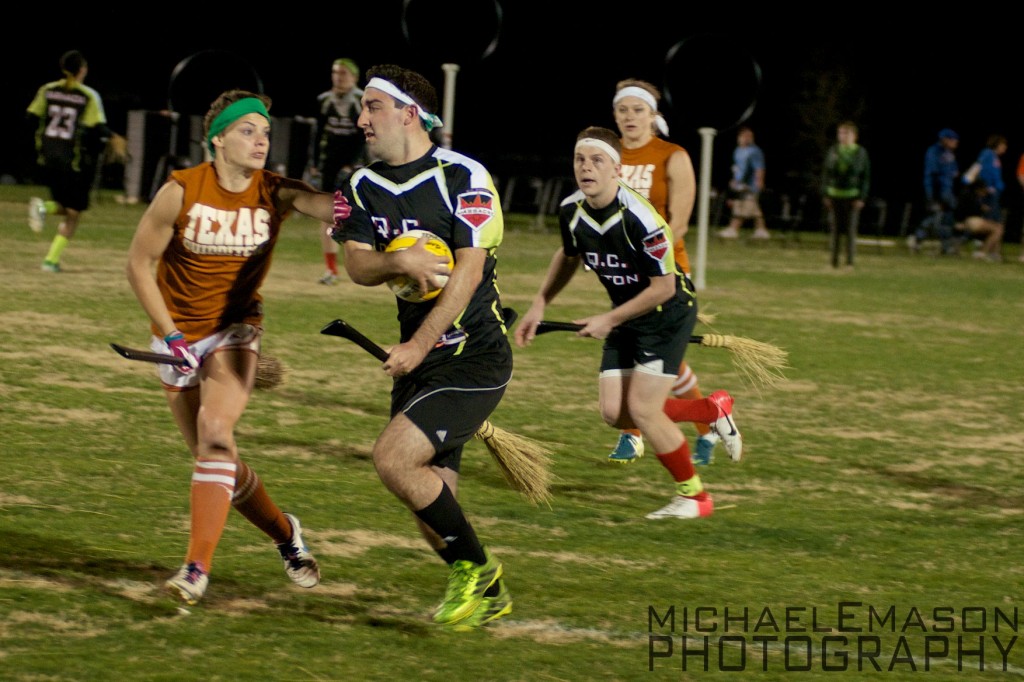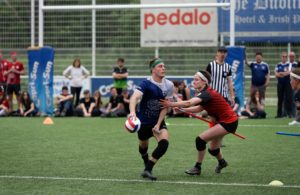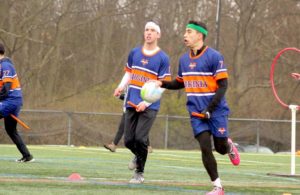- Rule, Britannia, no more?
- Unpopular Opinions: US Quadball Cup 2023
- Proven Contenders: University of Virginia
- Proven Contenders: Rutgers University
- Proven Contenders: University of Michigan
- Proven Contenders: Creighton University
- Different Perspectives: A Look Inside USA Ultimate
- Antwerp QC, Much of Belgian Core, Leaves Competitive Quidditch
Will They or Won’t They: QC Boston: The Massacre, #8
- By Devin Sandon
- Updated: September 18, 2014

Credit: Michael E. Mason
In addition to our preseason rankings, The Eighth Man staff will be releasing a series of articles focusing on the top 20 teams, counting down from 20 to one. Each article will be written by two members of the staff, one who believes the team will live up to or exceed expectations and one who thinks they will come up short.
Hype Train: Next Stop, Derailment
By Devin Sandon
We have all been down this road before. At the beginning of the 2013-14 season, our pollsters watched, eyes riveted, as each new addition to QC Boston: The Massacre was announced. We watched with mixed awe and envy as each new star announced their commitment, and we wondered how high this team might fly. We thought ourselves safe as we ranked them 12th in the country before they played a game, because how could they fail? They had the captains of the three best teams in the Northeast and the captain of the Mid-Atlantic regional champion signed on to play. They had all the makings of a truly beautiful quaffle game.
And so we waited, with expectant gaze for the glorious plays to emerge. All throughout the year we watched and waited. Massacre received votes in every single poll of the year as we approached World Cup, never falling below 23rd. World Cup would surely be where Massacre would prove their mettle and vindicate our analysis, we told ourselves. Sadly, we were wrong. At World Cup, Massacre won a single, solitary game over the 109th-ranked Indiana University South Bend, a team which did not even qualify for the World Cup initially. The Massacre finished 43rd at World Cup to cap off their 8–7 season.
So, looking at our expectations and the outcomes, we have to ask where we went wrong last year, and then ask what has now changed. The four big problems that Massacre faced last year were some combination of weakness and lack of depth at male beater, female beater, female chaser and seeker. At male beater, Sheldon Bostic was a very athletic player, but underdeveloped and with little behind him. Similarly, Kara Levis was a skilled and experienced female beater adjusting to injuries with no reliable subs. The Massacre female chasers were, in general, not noteworthy on either side of the ball, and perhaps the biggest hole was at seeker. The Massacre had a painful 0/5 record in SWIM situations. Now, it seems somewhat staggering that we can so casually point out weaknesses at four of the seven positions in a team that we thought had the potential for top-20 play, but everything is clearer in hindsight and we were so caught up in the strengths we believed Massacre enjoyed at the remaining three positions that we overlooked the concerns.
Now that we understand the concerns, let us look at the changes Massacre has made to correct them so that we can understand the claims that they will be a top-eight team. The two biggest changes that have been proposed to be the source of their improvement have been their recruitment of Boston University’s Max Havlin and Tufts University’s Michael Sanders at male beater. This, alongside the movement of Bostic to chaser, is expected to greatly improve Massacre’s beater game and give them some raw physicality in the quaffle game to make up for the departure of keeper Victor Viega. This, of course, leads to the second much-touted reason for their improvement: the departures of former captain Benny Nadeau, alongside Griffin Conlogue and Viega, and the transition of Zach D’Amico from player to coach. While several of these players were notorious both for their play and leadership skills, they meshed poorly with the team as a whole, causing internal strife that made it difficult for Massacre to succeed. While their departure will clear the way for reform and improvement, it does take away from Massacre’s talent pool.
Both of these adjustments are likely very much to Massacre’s benefit, but they still only address one of the four aforementioned concerns with Massacre’s actual talent.
Unfortunately, for every step forward, there is also a step back. Former UCLA standout beater Levis will be moving to chaser this year, and while she hopefully will be able to improve the lackluster performance of the Massacre’s female chasers, her transition invariably will hurt their female beating strength. The addition of former Emerson College beater Cassie Samuels is pleasant, but not enough to make up for the loss of Levis, and it certainly does not help with the lack of depth concern.
The final nail in the coffin, however, is the lack of answer at seeker. Massacre cannot and will not be a top-eight team if they cannot catch a snitch. Two years ago, our two World Cup finalists, UCLA and UT, both made it to their finals match without playing a single game in snitch range. This year, the margins of victory and the differences between our top teams were far smaller. The World Cup VII Elite Eight teams faced nine SWIM situations, as opposed to five from World Cup VI, and last season’s finalists faced six on their way to the championship.
As much as we may like Massacre’s quaffle game, particularly with Jayke Archibald stepping up to orchestrate plays, and the flashy play of Sanders and Havlin, betting on a team that cannot pull is a mistake. So if you want to know my expectations, let me simply advise that you take a step off that hype train before the conductor calls, “Next stop, Suicide Gulch!”
All Aboard
By Daniel Daugherty
When the dust settled in our preseason poll, QC Boston: The Massacre, a team who failed to even earn two wins at World Cup, was sitting in our top 10. Seem excessive? Well, it could be, except that this community team is prepared to make the largest year-to-year jump our sport has ever seen. By retaining their best players and addressing some of their key problem areas, they could be a real contender come April.
Returning the likes of Kedzie Teller, Jayke Archibald, Kara Levis and Sheldon Bostic is a great sign for Massacre. Teller is a two-time Team USA chaser and has proven over and over that he is the best quaffle player in the Northeast. He is also, in my opinion, the best on-ball defender in the league. His elite quickness, strength and aggression is the perfect recipe for being able to stop any ball handler in the game.
Then you have Archibald, who, according to many, had his coming out party this summer with his move to keeper. But his status as an elite performer should be nothing new, he is simply reaching his peak. He has been capable of carrying a team for years. At the 2012 Northeast Regional Championship, Archibald led the Hofstra University quaffle game to the semifinals.
That season, the top tier of the Northeast was composed of Boston University and Emerson College, two deep teams with many key players. But Hofstra was undoubtedly second tier, and that can be largely attributed to Archibald.
Massacre’s other two key returners are going through position changes this season, which may actually make them more effective. Levis will be moving to chaser, but with her arm limited by shoulder injuries, it might make the most sense to use her mind for the game to create points with smart cuts and natural athleticism. Bostic, meanwhile, is one of the strongest, most athletic players in the sport, and probably should have been playing chaser from the start. But now he will finally make the switch and be able to use his physicality to its fullest.
Part of the reason Levis and Bostic can make these switches is that Massacre did a good job of addressing some of their biggest needs from last season, most notably at male beater. After an entire season of having no standouts at this position, Massacre has reaped the rewards of the local schools’ graduations, with Team USA and Boston University’s Max Havlin and Tufts University’s Michael Sanders entering the fold, turning their below-average line into arguably one of the top five in the country. Adding former Emerson beater Cassie Samuels as a compliment to them will only further strengthen what the team can do in the bludger game.
The addition of these three beaters, all of whom are accustomed to playing on the game’s highest level, will also be a boon for the team’s previously questionable seeker game. Even if they cannot develop an elite seeker, they now have the beater game to give anyone that wears the yellow headband a real chance at putting a game away.
A huge issue plaguing community teams last year was internal strife. Most people look to the lack of practice time being the reason for a lack of chemistry on the pitch, but many of the teams had off-field issues as well, with the Lost Boys perhaps being the most notable. But Massacre had its fair share of player issues as well and spent the entire summer rebuilding its image and creating not just a group of good players that get along, but an actual team. With the addition of well-liked, talented players like Emerson’s Max Blaushild and RIT’s Jeff Sherman, Massacre has done just that.
With all of these new additions and changes to this roster, along with a total culture makeover, QC Boston: The Massacre becomes an immediate favorite to dethrone Boston University as Northeast Regional champion. People can throw out all of the reasons that it is risky to jump on the community team bandwagon, but given Massacre’s growth, I am confident that this will be an Elite Eight team come April.
About Devin Sandon
Devin is the creator of Quidditch Scores and @IQAscores, and all around a less omniscient and omnipresent version of Martin Pyne. Currently entering his fifth season with the University of Rochester, Devin is a two-time Team USA alternate. He has also served on the IQA Rules Team and Snitch Development Team.




4 Comments